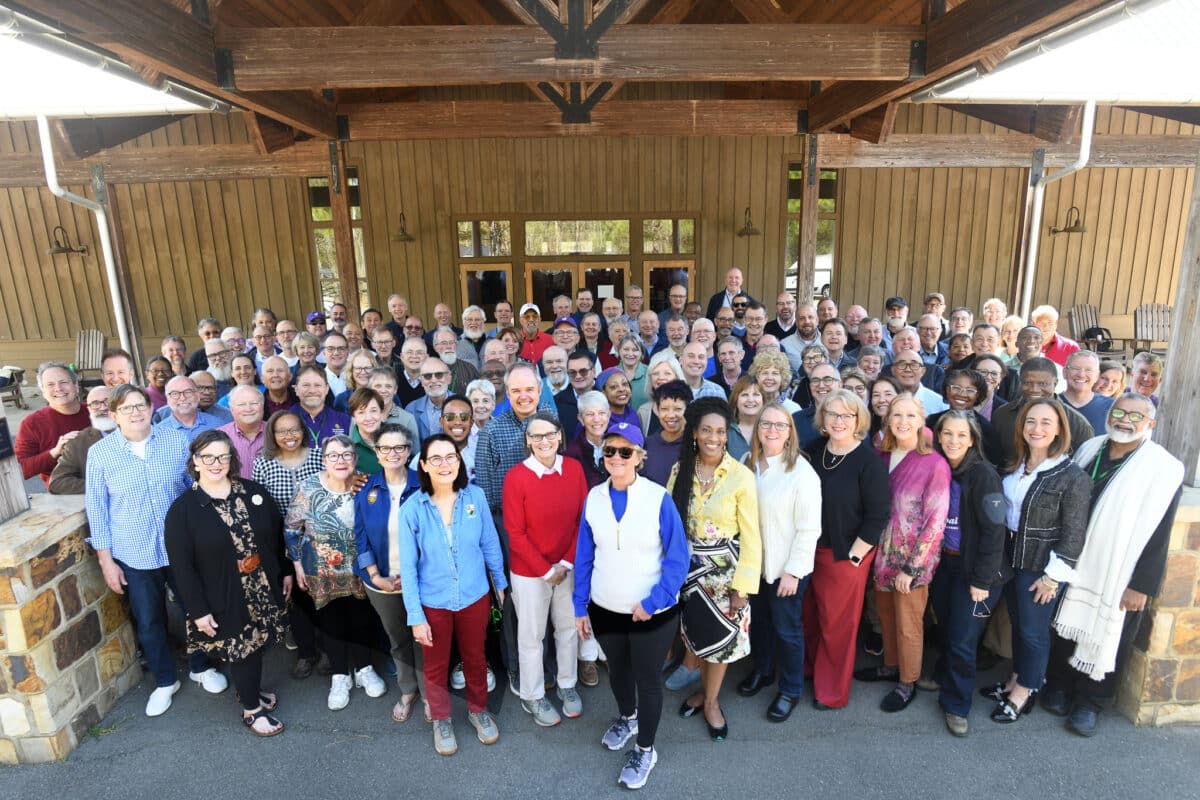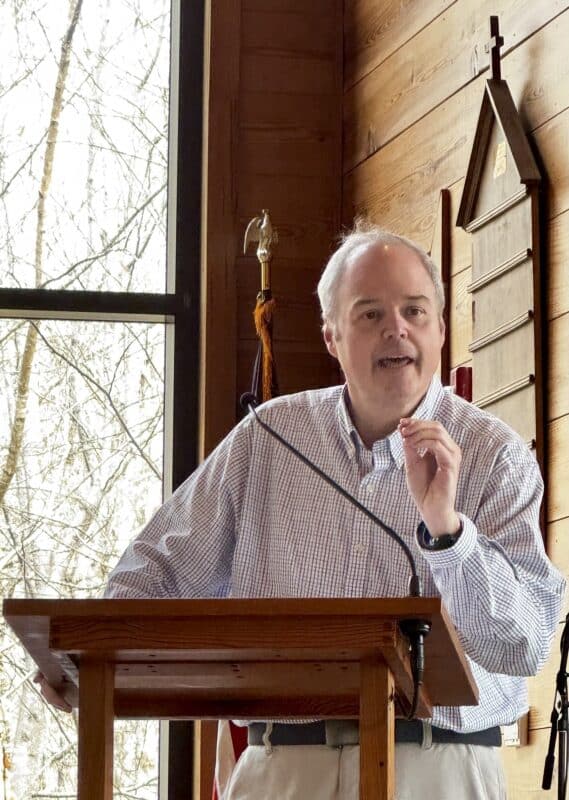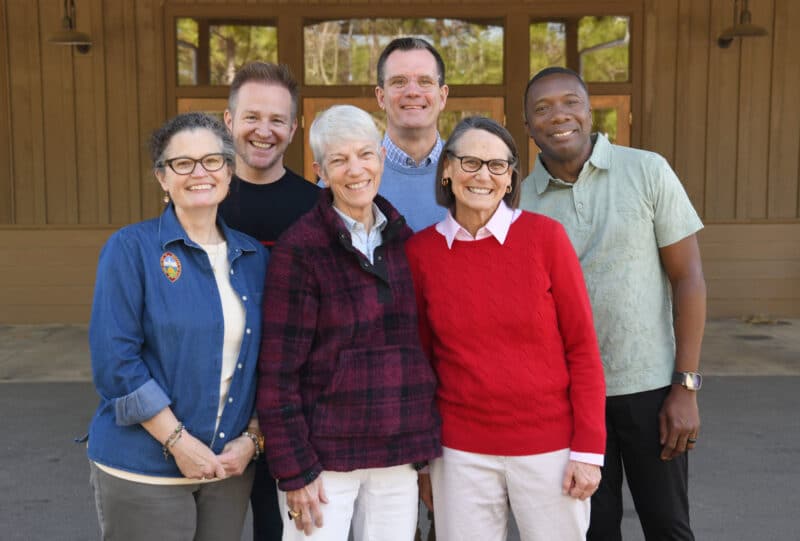
Photo: Bishops at Camp McDowell in Nauvoo, Alabama, for the Spring 2025 House of Bishops meeting. Courtesy of the Bishop of Georgia, Frank Logue.
To reflect on the recent House of Bishops (HOB) meeting last month at Camp McDowell in Nauvoo, Alabama, Maine Bishop Thomas Brown and New Hampshire Bishop Rob Hirschfeld joined me on Zoom for a Q+A. Our conversation has been edited for clarity and length.
Susan Axelrod: Before the HOB meeting, you gathered with other bishops from Province 1 for a retreat. Is that something you usually do?
Bishop Rob: Normally, Province 1 bishops meet during Advent for the greater part of a week. In Advent of ’24, we had to reschedule because we were called to Minneapolis for a day-long HOB meeting with the new presiding bishop. So, we thought, since we’re all going to be in Alabama anyway, why don’t we just show up a little earlier for that? Thomas arranged for the executive director of Camp McDowell to lead us on a quiet day—a nice container to reflect on our rule of life. As always, the highlight for me is just getting together outside of our usual context, exploring how God is speaking to us, comforting us, holding us, challenging us, and it’s a great time to share our fellowship in this ministry.
Bishop Brown: A big highlight of the retreat for me was that both Julia Whitworth, the new Bishop of Massachusetts, and Nathan Pipho, the new Bishop of the New England Synod of the Evangelical Lutheran Church in America were there. While we’re a tightly knit group, we are also always changing. Most of the times the bishops in New England gather, we have been a different group from the group we were the previous time.
SA: What was the biggest takeaway for each of you from the HOB meeting?
BR: I’ve been ruminating on this. What is that hymn? All else is shifting sand …
BB: My hope is built on nothing less than Jesus Christ and his righteousness. On Christ, the solid rock, I stand. All other ground is sinking sand.
BR: There you go. That brain of his is just amazing. There’s a lot of sinking sand. We are living in a world with a whole new level of chaos and change that is making us uneasy. The church is shifting with the new presiding bishop who has initiated a lot of structural reforms. Even though he promised these things, it still comes as a shock for many, and it’s disruptive. We’re trying to find our footing. Even though this was a meeting, it wasn’t a retreat, and we were dealing with topics that have to do with the institution—Title IV, how the church has partnered with other agencies, both in and outside the government to address the immigration crisis and ministry to our new Americans and refugees—we did not come out with any programmatic statement or a declaration about where the church stands on any one or all of these issues.
It feels that like many nonprofits and political parties—one in particular—we’re in a retreat mode before we make an advance, like we’re taking stock deliberately. There was an insertion of a quiet centering prayer every day that was new. I think there’s a sense of pressure and urgency; how long are you going to be taking stock? But there’s also a sense that we need to find out where is the solid rock that we’re standing on amid the sinking sand.
BB: I think that’s right, Bishop Rob. It’s a risky time to be a follower of Jesus right now. I think that risk is good, and I think the church is made for this moment. If we could get ourselves clear about the fact that for some of us, this is the first time we’ve had to do really hard things. In the Bishops Beyond Borders video, I quoted the Black theologian in Georgia who said, “The problem with a lot of you white people is that you’ve just been entertained for 70 years and now you actually have to do some work.” I think that we need to roll up our sleeves and declare and proclaim to our churches, especially in Maine and New Hampshire, that God has already given us everything we need to be faithful in this moment.
Yes, there is some risk, and the stakes are higher for some of us now than they have been, but that’s okay. One of the things that I hope for the presiding bishop is that as necessary and as much as I support all of the structural work that he’s doing, it coincides with the things that are happening in our nation’s government, and if we continue to only speak about structural reform in our church, it may sound as if we are not responding to the urgent needs of our society. I don’t think we are there right now, but I will want to work with everybody to make sure that we are also addressing issues that impact people’s lives on a day-to-day basis.

I also want to say something about a specific part of the meeting and the presiding bishop’s focus on Title IV disciplinary matters, particularly as they pertain to bishops. When the presiding bishop took office in November, there were over 30 cases pending, and now that’s down to fewer than seven. He is really committed to attending to these issues. In disciplinary work, very often our lack of keeping the process going creates more harm than whatever the alleged behavior is. That’s especially true with disciplinary matters against bishops. Previously it was like molasses to get stuff done, but this presiding bishop doesn’t act at that pace, he acts with alacrity. So, things are getting done and that’s good for the church, that’s good for bishops, that’s good for people who feel wronged. It’s just good all the way around.
But he’s also doing something else. He’s working with people who have expertise in conflict that isn’t about behavioral misconduct. So, I applaud both his getting stuff done and his recognition that when someone has a concern about a bishop, it’s not always a disciplinary matter, it could be a conflict matter, and those can be solved and discussed in different ways.
BR: With this presiding bishop, there seems to be a real commitment to speak directly to issues that we’re facing. I’ve been a bishop for almost 13 years, and I’ve heard after every general convention or HOB meeting, “But we’re not really talking about the things that we need to be talking about, one of which is numerical decline, some of the demographic shifts that are happening in the church in the wider culture.” And the presiding bishop seems to say, “Let’s uncover those rocks and look at those.” So, we spent a morning looking at statistics; they’re sobering and hopeful at the same time. They’re hopeful because we’re dealing with the truth.
There was a lot of truth telling at this HOB about the state of the church, both the bad news and the good news, the challenging news and the promising news. Title IV as Bishop Brown was talking about. Also, our facing or our being caught surprised around the rise of Christian nationalism. Atlanta Bishop Rob Wright gave a presentation on that like the one he gave last year in Maine. It was a dense meeting.

BB: Bishop Rob, I think you’re absolutely right about the truth being told. And also I heard some senior bishops who felt that trust among us is getting deeper and wider and therefore things felt real. One of the things that I think you know more about than I do, Rob, is that because the presiding bishop has been a bishop for a long time, he knows everybody very well. That matters doesn’t it? The HOB is also more diverse. Frank Logue, the Bishop of Georgia, always takes group photographs, and they reveal a changing community. We’re now nearly 50 percent women. There’s a photograph of the EBAD—Episcopal Bishops of African Descent–as well as one with those of us who are LGB—there’s no T or Q yet. For the first time there’s a Latina bishop. Every time we gather, and we get those group photographs, what I notice is that some of those communities are getting larger, and that is just a beautiful thing to see.
BR: Underscoring that was during the big day of all the graphs and the statistics around the life of the church from the statisticians, the factoid that among those who are priests, deacons and bishops, the HOB is the most diverse in terms of gender, race, and sexual orientation. That’s been the work of deliberate recruiting and supporting those who may feel called to the Episcopate.
SA: I think you’ve just answered my next question, which was, “This was the new presiding Bishop’s first time leading the HOB. What about his message and leadership resonates the most with you?”
BR: I think he’s convinced as I am—and I think Thomas is—that this church is built for times such as these. It’s a church that grounds itself in a sense of community, but not necessarily a community of like-minded or like-looking people. And it’s currently involved in a project of building and strengthening that sense of community for right action, which is going to come. What that looks like, how that might express itself is in God’s mind right now, and we’re discerning it. I remember some years ago, one of Bishop Wright’s first addresses to the HOB. He referred to the crozier as a lever and suggested that we use it wisely. Also, that we need to find out where exactly the fulcrum is for a movement, where the pressure point is that’s going to be most effective.
I’ve carried that with me. I feel like right now we are in a moment where we can’t just stick the crozier in everywhere. I think the evil one is asking us to just diffuse our power and our efficacy by addressing everything that’s happening with such ferocity and frequency that it’ll weaken us. I think we’re in a place of wise discernment of finding out where is our lever that…as Archimedes said, “Give me a lever and a fulcrum and I can move the world.” That’s what we’re about right now. It’s going to be frustrating because I feel the pressure every day. “How come you’re not here, there, everywhere?” God is here, there and everywhere and God is clearly directing us in God’s inscrutable ways.
SA: Was there anything about this HOB meeting that surprised you, that you didn’t expect, either good or bad?
BB: I don’t usually go to the evening social at seven o’clock. But I did go once and there were a lot of bishops there, a lot of fun being had. When I joined the HOB, there was a small group of poker playing bishops, maybe 10 of them. Last year there was a bishop who said, “I’m more of a wine and Uno girl.” So, she started an Uno table. The night that I went this year, there were seven tables of Uno being played, with people of all ages, races, and languages, some people learning to play Uno for the first time, and some playing Uno for the first time in 20 years. A delightful surprise was seeing how much fun they had with each other. And because I’m still relatively new, I’ve of course heard stories of when there were bishops who wouldn’t even speak to each other, going back as recently as the early 1990s, particularly around human sexuality. I just don’t think that’s at all true now. I don’t know what you would say Rob, but there’s not a single bishop that I would not gladly sit down and have a cup of coffee with.
BR: I totally agree. I’ve been part of this little group of self-identified contemplative bishops, and over the past five years, it’s grown from maybe five or six to 35, 40 people. And there’s no mysterious technique. It’s not a gimmick. It’s just like we need to just sit in the presence of God. And that’s been something to witness. I think it has an effect on the whole body, a ripple effect. Early on in this gathering, somebody cited Evelyn Underhill, the great twentieth century mystic and British spiritual writer, who apparently wrote a little note to the gathering of the bishops in Great Britain sometime during World War II, “My lords, I urge you to remember that the most interesting thing about the church is God.” I feel like that’s resonating among us.
BB: That’s so beautifully said. The more that we can make God the subject of our sentences, the more we’ll be able to speak to this moment and live in this moment.